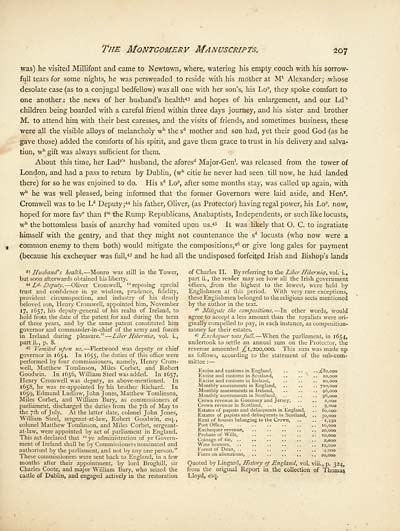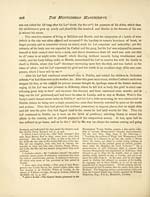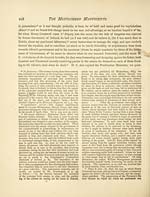Montgomery manuscripts
(221) Page 207
Download files
Complete book:
Individual page:
Thumbnail gallery: Grid view | List view

The Montgomery Manuscripts.
207
was) he visited Millifont and came to Newtown, where, watering his empty couch with his sorrow-
full tears for some nights, he was persweaded to reside with his mother at M' Alexander; whose
desolate case (as to a conjugal bedfellow) was all one with her son's, his Lo p , they spoke comfort to
one another : the news of her husband's health 43 and hopes of his enlargement, and our Ld' s
children being boarded with a careful friend within three days journey, and his sister and brother
M. to attend him with their best caresses, and the visits of friends, and sometimes business, these
were all the visible alloys of melancholy w'' the s d mother and son had, yet their good God (as he
gave those) added the comforts of his spirit, and gave them grace to trust in his delivery and salva-
tion, w h gift was always sufficient for them.
About this time, her Lad p ' s husband, the afores d Major-Gen 1 , was released from the tower of
London, and had a pass to return by Dublin, (w h citie he never had seen till now, he had landed
there) for so he was enjoined to do. His s d Lo p , after some months stay, was called up again, with
w b he was well pleased, being informed that the former Governors were laid aside, and Hen y .
Cromwell was to be L d Deputy; 44 his father, Oliver, (as Protector) having regal power, his Lo p . now,
hoped for more fav r than f m the Rump Republicans, Anabaptists, Independents, or such like locusts,
w h the bottomless basis of anarchy had vomited upon us. 45 It was likely that O. C. to ingratiate
himself with the gentry, and that they might not countenance the s d locusts (who now were a
common enemy to them both) would mitigate the compositions, 46 or give long gales for payment
(because his exchequer was full, 47 and he had all the undisposed forfeited Irish and Bishop's lands
« Husband's health. — Monro was still in the Tower,
but soon afterwards obtained his liberty.
44 Ld- Deputy. — Oliver Cromwell, "reposing special
trust and confidence in ye wisdom, prudence, fidelity,
provident circumspection, and industry of his dearly
beloved son, Henry Cromwell, appointed him, November
17, 1657, his deputy-general of his realm of Ireland, to
hold from the date of the patent for and during the term
of three years, and by the same patent constituted him
governor and commander-in-chief of the army and forces
in Ireland during pleasure." — Liber Hibemies, vol. i.,
part ii., p. 8.
4 s Vomited upon us. — Fleetwood was deputy or chief
governor in 1654. In 1655, the duties of this office were
performed by four commissioners, namely, Henry Crom-
well, Matthew Tomlinson, Miles Corbet, and Robert
Goodwin. In 1656, William Steel was added. In 1657,
Henry Cromwell was deputy, as above-mentioned. In
1658, he was re-appointed by his brother Richard. In
1659, Edmund Ludlow, John Jones, Matthew Tomlinson,
Miles Corbet, and William Bury, as commissioners of
parliament, discharged the duties from the 7th of May to
the 7 th of July. At the latter date, colonel John Jones,
William Steel, sergeant-at-law, Robert Goodwin, esq.,
colonel Matthew Tomlinson, and Miles Corbet, sergeant-
at-law, were appointed by act of parliament in England.
This act declared that "ye administration of ye Govern-
ment of Ireland shall be by Commissioners nominated and
authorised by the parliament, and not by any one person."
These commissioners were sent back to England, in a few
months after their appointment, by lord Broghill, sir
Charles Coote, and major William Bury, who seized the
castle of Dublin, and engaged actively in the restoration
of Charles II. By referring to the Liber Hibernia', vol. i.,
part ii. , the reader may see how all the Irish government
offices, /rom the highest to the lowest, were held by
Englishmen at this period. With very rare exceptions,
these Englishmen belonged to the religious sects mentioned
by the author in the text.
46 Mitigate the compositions. — In other words, would
agree to accept a less amount than the royalists were ori-
ginally compelled to pay, in each instance, as composition-
money for their estates.
47 Exchequer was full. — When the parliament, in 1654,
undertook to settle an annual sum on the Protector, the
revenue amounted ^1,200,000. This sum was made up
as follows, according to the statement of the sub-com-
mittee : —
Excise and customs in England, .. .. . . ,£80,000
Excise and customs in Scotland, . . . . ' . . 10,000
Excise and customs in Ireland, .. .. .. 20,000
Monthly assessments in England, . . . . . . 720,000
Monthly assessments in Ireland, . . . . . . 96,000
Monthly assessments in Scotland, . . . . . . 96,000
Crown revenue in Guernsey and Jersey, . . . . 2,000
Crown revenue in Scotland, . . . . . . . . 9,000
Estates of papists and delinquents in England, . . 60,000
Estates of papists and delinquents in Scotland, . . 30,000
Kent of houses belonging to the Crown, . . . . 1,250
Post Office, . . . . . . . . . . . . 10,000
Exchequer revenue, . . . . . . . , . . 20,000
Probate of Wills, , . . . . . . . . . 10,000
Coinage of tin, .. .. .. .. .. .. 2,000
Wine licenses, .. .. .. .. .. ., 10,000
Forest of Dean, .. .. .. .. .. .. 4,000
Fines on alienations, .. .. .. ., .. 20,000
Quoted by Lingard, History oj England, vol. viii., p. 324,
from the original Report in the collection of Thomas
Lloyd, esq.
207
was) he visited Millifont and came to Newtown, where, watering his empty couch with his sorrow-
full tears for some nights, he was persweaded to reside with his mother at M' Alexander; whose
desolate case (as to a conjugal bedfellow) was all one with her son's, his Lo p , they spoke comfort to
one another : the news of her husband's health 43 and hopes of his enlargement, and our Ld' s
children being boarded with a careful friend within three days journey, and his sister and brother
M. to attend him with their best caresses, and the visits of friends, and sometimes business, these
were all the visible alloys of melancholy w'' the s d mother and son had, yet their good God (as he
gave those) added the comforts of his spirit, and gave them grace to trust in his delivery and salva-
tion, w h gift was always sufficient for them.
About this time, her Lad p ' s husband, the afores d Major-Gen 1 , was released from the tower of
London, and had a pass to return by Dublin, (w h citie he never had seen till now, he had landed
there) for so he was enjoined to do. His s d Lo p , after some months stay, was called up again, with
w b he was well pleased, being informed that the former Governors were laid aside, and Hen y .
Cromwell was to be L d Deputy; 44 his father, Oliver, (as Protector) having regal power, his Lo p . now,
hoped for more fav r than f m the Rump Republicans, Anabaptists, Independents, or such like locusts,
w h the bottomless basis of anarchy had vomited upon us. 45 It was likely that O. C. to ingratiate
himself with the gentry, and that they might not countenance the s d locusts (who now were a
common enemy to them both) would mitigate the compositions, 46 or give long gales for payment
(because his exchequer was full, 47 and he had all the undisposed forfeited Irish and Bishop's lands
« Husband's health. — Monro was still in the Tower,
but soon afterwards obtained his liberty.
44 Ld- Deputy. — Oliver Cromwell, "reposing special
trust and confidence in ye wisdom, prudence, fidelity,
provident circumspection, and industry of his dearly
beloved son, Henry Cromwell, appointed him, November
17, 1657, his deputy-general of his realm of Ireland, to
hold from the date of the patent for and during the term
of three years, and by the same patent constituted him
governor and commander-in-chief of the army and forces
in Ireland during pleasure." — Liber Hibemies, vol. i.,
part ii., p. 8.
4 s Vomited upon us. — Fleetwood was deputy or chief
governor in 1654. In 1655, the duties of this office were
performed by four commissioners, namely, Henry Crom-
well, Matthew Tomlinson, Miles Corbet, and Robert
Goodwin. In 1656, William Steel was added. In 1657,
Henry Cromwell was deputy, as above-mentioned. In
1658, he was re-appointed by his brother Richard. In
1659, Edmund Ludlow, John Jones, Matthew Tomlinson,
Miles Corbet, and William Bury, as commissioners of
parliament, discharged the duties from the 7th of May to
the 7 th of July. At the latter date, colonel John Jones,
William Steel, sergeant-at-law, Robert Goodwin, esq.,
colonel Matthew Tomlinson, and Miles Corbet, sergeant-
at-law, were appointed by act of parliament in England.
This act declared that "ye administration of ye Govern-
ment of Ireland shall be by Commissioners nominated and
authorised by the parliament, and not by any one person."
These commissioners were sent back to England, in a few
months after their appointment, by lord Broghill, sir
Charles Coote, and major William Bury, who seized the
castle of Dublin, and engaged actively in the restoration
of Charles II. By referring to the Liber Hibernia', vol. i.,
part ii. , the reader may see how all the Irish government
offices, /rom the highest to the lowest, were held by
Englishmen at this period. With very rare exceptions,
these Englishmen belonged to the religious sects mentioned
by the author in the text.
46 Mitigate the compositions. — In other words, would
agree to accept a less amount than the royalists were ori-
ginally compelled to pay, in each instance, as composition-
money for their estates.
47 Exchequer was full. — When the parliament, in 1654,
undertook to settle an annual sum on the Protector, the
revenue amounted ^1,200,000. This sum was made up
as follows, according to the statement of the sub-com-
mittee : —
Excise and customs in England, .. .. . . ,£80,000
Excise and customs in Scotland, . . . . ' . . 10,000
Excise and customs in Ireland, .. .. .. 20,000
Monthly assessments in England, . . . . . . 720,000
Monthly assessments in Ireland, . . . . . . 96,000
Monthly assessments in Scotland, . . . . . . 96,000
Crown revenue in Guernsey and Jersey, . . . . 2,000
Crown revenue in Scotland, . . . . . . . . 9,000
Estates of papists and delinquents in England, . . 60,000
Estates of papists and delinquents in Scotland, . . 30,000
Kent of houses belonging to the Crown, . . . . 1,250
Post Office, . . . . . . . . . . . . 10,000
Exchequer revenue, . . . . . . . , . . 20,000
Probate of Wills, , . . . . . . . . . 10,000
Coinage of tin, .. .. .. .. .. .. 2,000
Wine licenses, .. .. .. .. .. ., 10,000
Forest of Dean, .. .. .. .. .. .. 4,000
Fines on alienations, .. .. .. ., .. 20,000
Quoted by Lingard, History oj England, vol. viii., p. 324,
from the original Report in the collection of Thomas
Lloyd, esq.
Set display mode to:
![]() Universal Viewer |
Universal Viewer | ![]() Mirador |
Large image | Transcription
Mirador |
Large image | Transcription
Images and transcriptions on this page, including medium image downloads, may be used under the Creative Commons Attribution 4.0 International Licence unless otherwise stated. ![]()
| Histories of Scottish families > Montgomery manuscripts > (221) Page 207 |
|---|
| Permanent URL | https://digital.nls.uk/95235579 |
|---|
| Description | A selection of almost 400 printed items relating to the history of Scottish families, mostly dating from the 19th and early 20th centuries. Includes memoirs, genealogies and clan histories, with a few produced by emigrant families. The earliest family history goes back to AD 916. |
|---|

